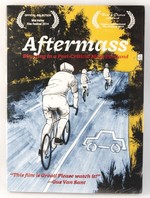Anarchism in America / Free Voice of Labor DVD
by Steven Fischer Author
Two historic time capsule documentaries on one DVD from Steven Fischler and Joel Sucher. In "Anarchism in America", they take a road trip to map anarchism as a distinctly American tradition, interviewing a diverse cast of ordinary people like truckers and factory workers as well as famous anarchists like Kenneth Rexroth, Ursula LeGuin, and Murray Bookchin. In "Free Voice of Labor", we trace the history of the Yiddish anarchist newspaper of the same name - publishing the final issue after 87 years—as told by its now elderly, but decidedly unbowed staff. Also included is first hand accounts of the labor organizing, propaganda, educational experiments, and monumental contributions from these cherished, if largely unsung, heroes of the American anarchist movement.
You must log in to comment.











Comments & Reviews
I fucing love Anarchism in America. Every anarchist and punk should see it at least once. Good music in it too.
The film presents newsreel footage of key figures in the history of American anarchism, among them Sacco and Vanzetti, and Emma Goldman. ("What is your opinion of Italy?" a reporter asks her. "Beautiful country minus Mussolini," she snaps in reply.) And there are contemporary interviews with figures including Mollie Steimer, Emma Goldman's girlhood friend, and the poet Kenneth Rexroth, who reads his Sacco and Vanzetti poem. There is also some discussion of what the film makers take to be anarchism's practical applications, such as food co-ops and town meetings.
Karl Hess, formerly a Newsweek writer and speechwriter for Barry Goldwater, discusses his evolution from Republican to anarchist. And the writer and teacher Murray Bookchin gives an exceptionally articulate description of his own ideological development. He explains why he finds anarchism more all-embracing than Marxism, because he believes it addresses "not just classes but hierarchy." Anarchism can be broadly applied, he says, to forms of domination "which may not have any economic meaning at all."
A wonderful evocation of the radical political past and what has become of its activists in their old age. It takes it's name from the Yiddish anarchist newspaper, which finally died in 1987 at the age of 87. The film is an oral history, given by those who lived through the era. It's more than merely that, however. It uses clips from old movies, in Yiddish, that dealt with the ugliness of the sweatshop. You hear the Yiddish songs and poems inveighing against oppression and calling for the people to rise up.
But the joy in the film lies in the people who belonged to the movement. They have aged gracefully, with their sentiments unchanged, but with their world different in ways they would never have dreamed of years ago. They speak with humor of demostrations, picket lines, battles of long ago. They speak as Jews, but secular Jews whose visions were of an unbossed universality. They are grandmas and grandpas, as sunny and mellow as any others, but their courage, intelligence and social concern still shines in their faces. They were a movement, mostly nonviolent, unlike the caricature anarchist bomb-thrower, but their families have grown into middle-class America. They no longer fight, but they still think."—New York Times